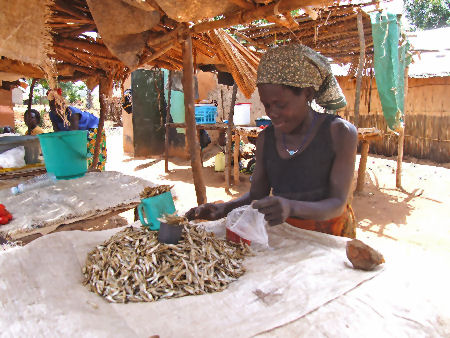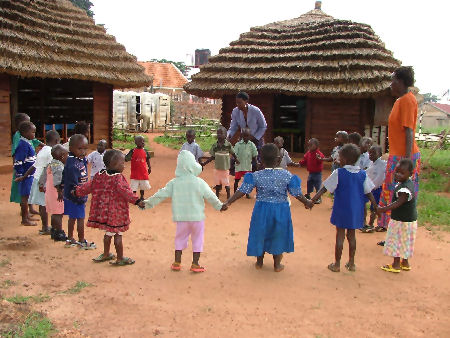Community support in Gulu
08/05/2008
Update from September 2007
The SOS Social Centre in Gulu supports over 250 children and mothers in the community who have been affected by the civil war with counseling, and medical, nutritional and educational support. Former child soldiers also receive counseling.
Education, health care and employment are human rights. Due to poverty, illness and the political unrest in the area, the number of children without the support of their natural family is increasing steadily and SOS Children is constantly developing its approach to child care in order to meet these changing needs.The aim of our “Family Strengthening Programmes” and SOS Social Centres is to respond realistically and effectively to the situation of orphans, vulnerable children and their families and to prevent child abandonment. Through skills training, literacy classes, education, counseling and improved nutrition the families know they can become independent, self-reliant and confident in their own ability to provide for the children in their care. Ultimately the communities want to care for their children.
SOS Social Centre, Gulu

The Social Centre opened in June 2002 and currently provides all the services mentioned above to 250 children and female guardians/mothers. The parents/guardians are also supported with training in agriculture and tailoring, for example, and those who want to set up small businesses are offered business training and micro loans; they will ultimately be more able to financially and emotionally support the children in their care and this lessens the risk of child abandonment. We also run a day-care centre for 50 children from single-parent families here, and the SOS Medical Centre, which is part of the SOS Social Centre, cares for 60-80 patients per day (roughly 25,500 people each year). The patients receive health counseling (for example, counseling for people affected by HIV/AIDS), health education and immunization programmes. Preventative medical services are the mainstay of this clinic, but medicines are also provided to the sick.
The situation in northern Uganda for women and children today
It is now over one year since peace talks between the Ugandan government and the Lord's Resistance began in Sudan. A year later little has changed and people are still suffering, especially women and children.
The endless war in northern Uganda has affected mostly women and children. Many women have become widows as a result of the rebels killing their husbands. Consequently, they are overloaded with the heavy responsibility of looking after orphans.
And women do not have time to rest. They wake up early in the morning to find ways of feeding their children, with whom they have to move long distances in search of food. At the end of the day, they come back very tired, and so stressed and frustrated that they cannot sleep at night.
The majority of women are suffering due to the loss of their husbands and relatives. They look for money to take their children to school yet they have no proper source of income, nobody to give them a hand, because almost everybody finds herself in the same situation.
The war leave bad memories

Socially, most women have low self-esteem as a result of this war that has left with them lifelong bad memories. Either they have been sexually abused by the rebels and other people taking advantage of war, or they have been abducted from their families and taken to the bush, where they have seen their loved ones being killed. They find themselves lonely and isolated leading to low self-esteem and inability to cope in the society.
Many young women are child mothers who bore children after being forced into marriage by the rebels at a young age. This has affected their own mothers who see their daughters returning home, at the age of 20, with several children. And the social life of the local Acholi women has greatly changed. Some women have become unfaithful while others have unwanted pregnancies and end up either aborting or abandoning the babies on failing to be supported.
Children are traumatised
Children, on the other hand, have been very much abused. They return home from the bush when they are mentally traumatised and unable to live with other normal children. They display inappropriate behaviour to the extent that handling them requires specialists, who are lacking in our community. Men have abandoned their families and children have suffered most. This explains why there is an increasing number of street children in Gulu town and other towns in northern Uganda.
However, despite the overwhelming numbers of needy children, SOS Children is playing a very important role in preventing child abandonment and catering for the orphaned and abandoned children of northern Uganda. For the sake of the women and children of northern Uganda, the peace talks must not fail.
Relevant Countries: Uganda.